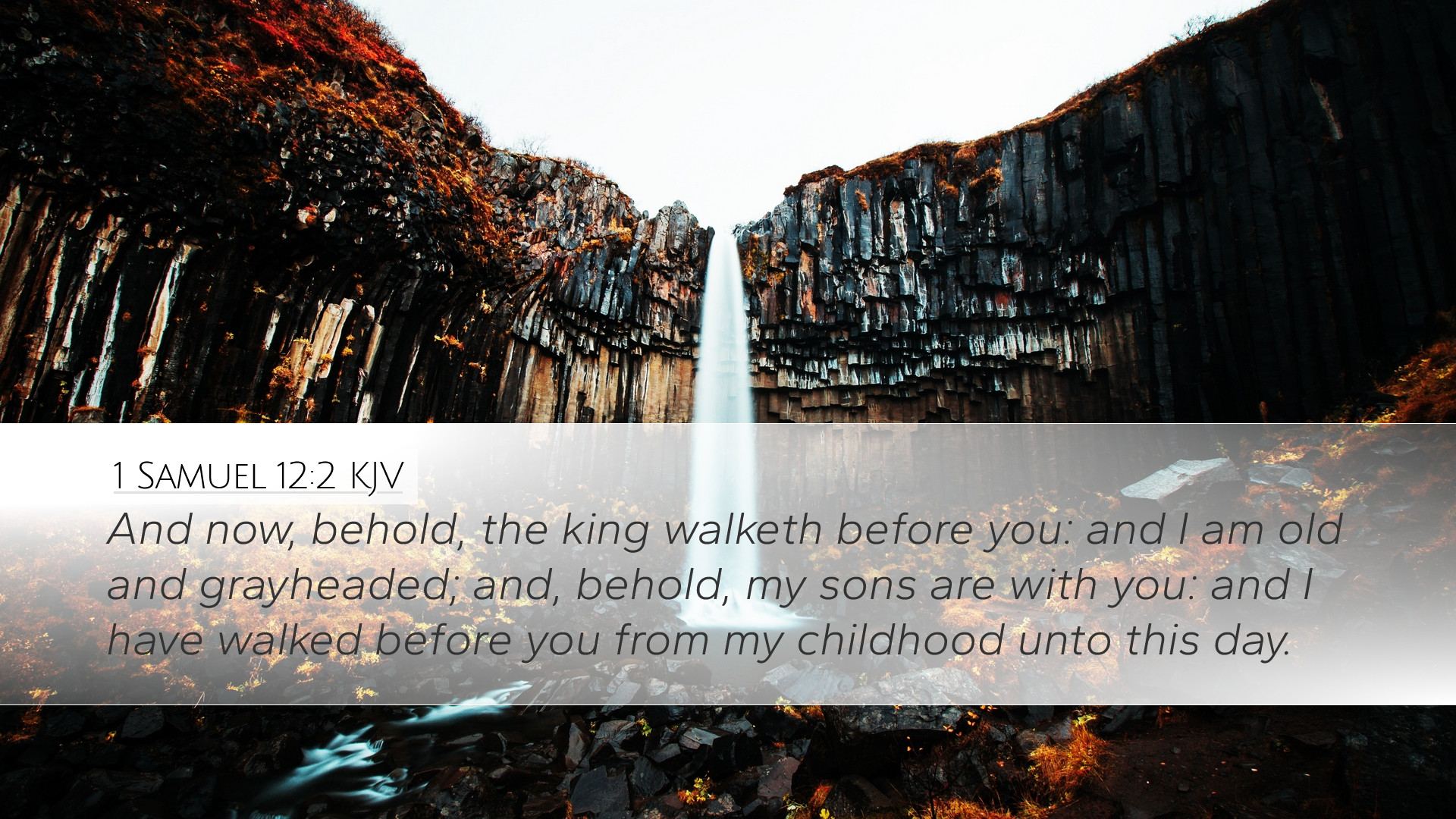Commentary on 1 Samuel 12:2
In 1 Samuel 12:2, the prophet Samuel addresses the people of Israel, saying:
"And now, behold, the king walketh before you: and I am old and grayheaded; and behold, my sons are with you: and I have walked before you from my childhood unto this day."
Overview
This verse serves as a significant transition in the narrative of Israel's history. With the appointment of a monarchy, Samuel reflects on his life, leadership, and the changes in governance.
Exegesis and Context
To understand 1 Samuel 12:2, it is crucial to consider the broader context. The Israelites had demanded a king to rule over them, which marked a pivotal shift from theocratic to monarchical leadership. Samuel, who had served as a judge and prophet, acknowledges this change while emphasizing his role and fidelity.
Insights from Commentaries
-
Matthew Henry:
Henry highlights the gravity of this address, noting Samuel's acknowledgment of his age and the presence of his sons. He underscores the contrast between Samuel's faithful leadership and the potential shortcomings of a monarchy influenced by human fallibility. Henry points out that Samuel’s leadership has been marked by integrity and commitment to God’s will.
-
Albert Barnes:
Barnes examines the implications of Samuel’s words regarding the monarchy. He reflects on the appointment of a king as an act of the people’s desire rather than divine direction. In his commentary, Barnes emphasizes Samuel’s pastoral role, urging the people to hold their new king accountable to God’s law, thus establishing the integrity needed for the new era of leadership.
-
Adam Clarke:
Clarke provides a detailed analysis of the phrase “I have walked before you” as a testimony of Samuel’s longstanding service. He notes the dual role of the prophet as a religious leader and administrator, emphasizing that clarity in one's life and actions is essential for leadership. Clarke also touches on the responsibilities of the new king and challenges the Israelites to remember God's foundational principles as they move into this new governmental structure.
Theological Themes
1 Samuel 12:2 encompasses several theological themes that are pertinent for deeper reflection:
-
Leadership and Accountability:
This verse begins a conversation about the nature of leadership in Israel. Samuel’s recognition of his aging and the presence of his sons serve as a reminder of the need for accountability within leadership structures.
-
Transition and Change:
The transition from judges to a monarchy represents significant change within Israel. It raises questions about trust in human leadership versus divine guidance, encouraging readers to reflect on their own leadership contexts.
-
The Role of the Prophet:
Samuel’s insistence on his long-term dedication highlights the prophetic calling. The prophet’s guidance is pivotal in navigating the challenges that accompany leadership decisions. The clear delineation between divine instruction and human desire is an essential theme.
Application for Contemporary Readers
For pastors, students, and scholars, 1 Samuel 12:2 provides rich soil for application:
-
Modeling Integrity:
Church leaders are reminded to emulate Samuel’s integrity in their ministries, ensuring that their lives reflect God’s character in their leadership roles.
-
Understanding Leadership Dynamics:
This passage invites believers to consider the dynamics of authority and service within their communities, encouraging a model of mutual accountability and obedience to God’s will.
-
Prayerful Consideration of Change:
As individuals and congregations face transitions, this verse encourages seeking God's direction amidst changes. It serves as a reminder to ensure that such transitions align with biblical principles rather than mere desires.
Conclusion
1 Samuel 12:2 is more than a historical narrative; it invites serious contemplation about the nature of leadership, the transitions in governance, and the spiritual integrity required in both historical and contemporary contexts. By reflecting on Samuel’s life and the dynamics of leadership within Israel, modern readers are equipped to grapple with their own contexts of spiritual leadership and community governance.


